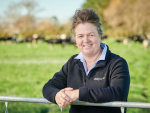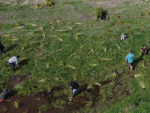Southland is on the knife edge as farmers struggle to grow enough feed to get their stock through winter.
DairyNZ’s head consulting officer in the South Island, Tony Finch, told Dairy News that farmers have been lucky that autumn and the early days of winter have been kind to them, allowing pastures to partly recover and grow more grass than they expected. But despite this, pasture covers are down for this time of the year.
Tony Finch says the countryside looks beautiful at the moment and the milder weather has enabled winter crops to grow, but adds that the slaughter of cull cows is still close to a fortnight behind.
“The backlog means those animals are taking feed that would normally be set aside for capital stock. The challenge and knife edge is the fact that we have still not caught up with pasture covers and that winter crops are down as a consequence of the wet season we have had. You hear everything from 10% to 20% down on yield and in some cases, yields are down by 40%,” he says
Finch says with the winter just starting the effects of these issues are not being felt. He points out that Southland is like the West Coast of the South Island and that inevitably there will be a cold wet storm at some stage and that will be the test of where things are at.
“The areas that are likely to be worst off are those that were hit by severe flooding, whereas farmers in northern Southland have been able to benefit from a very kind autumn,” he says.
Like the rest of NZ, there is little spare baleage in the region and any spare is accounted for in feed budgets, says Finch.
“I don’t hear too many people talking about surpluses. Hopefully they will get through, but if we get cold weather, some farmers will be challenged,” he says.
Despite the difficulties farmers in the region are facing, Finch says cow condition is generally speaking good. He says farmers have been focusing on that while at the same time having to feed animals they are waiting to send to the works. Finch says he’s received no reports about cows being underfed and says body condition scores are good.
But he says while conditions in the region have improved, there is no room for complacency.
“I want to make sure that people are aware we are not out of the woods yet. We don’t know what the winter will bring and we are at the mercy of the winter. Farmers need to be really vigilant around feed budgeting, doing yield analysis on their crops and have a clear picture of where they are at in terms of feed,” he says.
To help farmers DairyNZ and Beef+LambNZ and other industry groups including the Rural Support Trust have set up special services to help farmers through the winter. These include help-lines including 0800 233 352 for dry stock and 0800 4324 79689 for dairy cows.
Average season on West Coast
It's been an average season for dairy farmers on the West Coast of the South Island, according to DairyNZ’s head consulting officer in the South Island Tony Finch.
He says it’s been a bit of an up-and-down season on the coast and because it’s such a large region with different climatic conditions, it’s hard to define what an average season is like.
Parts of south Westland experienced floods and farmers there were badly affected. He adds there were other places where it was dry.
“I think they had a period of very cold weather which had an impact on growth rates for a period, but they have finished their season and have had to dry off everything because Westland Milk Products are doing a complete shutdown,” he told Dairy News. “Also, a lot of farmers acted a lot earlier to ensure their cows were in good condition for the new season and so body condition scores are good.”

















